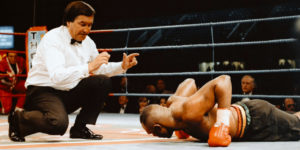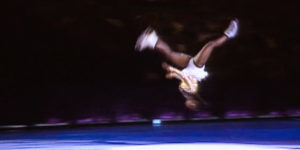Trailer for Losers, now on Netflix:
Losers. What a title for a documentary series! Who wants to watch people fail, especially big-time failures in professional boxing and golf, Olympic skating, basketball, dog-sledding, endurance racing, soccer, and curling?
I might be forgiven for having those thoughts when my wife and I started watching the first episode of Losers on Netflix – the tale of Michael Bentt, a World Boxing Organization Heavyweight Champion, whose turbulent early life and career as a boxer was endured for decades to please his abusive father. His boxing career ultimately came to a sudden end after losing his WBO belt in a knockout loss against Herbie Hide in 1994. But – and here’s the kicker – we then see how the defeat led Bentt to discover his true passion in life, in which he unexpectedly forged a successful and very fulfilling career. No spoilers here…but I will say that the ending is a stunner.
We were soon hooked on the series, and in short order, something became very clear. In one very important sense, this is not really a series about losers. Rather, it vividly and often poignantly portrays how loss can be the beginning of a meaningful life. It’s a show about redemption, about resilience, about standing up after a very bad fall, about having the self-honesty to re-evaluate one’s life, and about trying something new. The only difference between us and the people featured in each episode is that their loss is an extremely public affair.
The series is also a very personal effort. New York-based Creator, Producer and Director Mickey Duzyj is a talented animator, and on a roll as a filmmaker. But when he was a teenager, he ached to be a professional tennis player.
One day during his high school years he lost a match – and lost so badly that he suddenly had to admit he did not have the natural ability to be a champ. He had never before been confronted with loss around an aspiration in quite that stark a manner. It struck him that we are defined in many ways by how we respond to our biggest challenges.
What follows is part of my interview with Mickey Duzyj, including some video clips of our conversation.
Mickey Duzyj: There’s nothing more universal than having imperfections, and having moments where things don’t work out perfectly, but that’s okay. I discovered there are people in society who can show us what is really important.
Duzyj explains further why he chose these subjects and their stories for his series:
Time and again, the real life people portrayed in Losers have a personal epiphany, not just about their status in sport, but something much deeper. Millennials, of which Duzyj is one, often seem to say they have a different goal in life than “winning” and “being a success”.
Mickey Duzyj: I think that this kind of shifting of what success might look like comes from the fact that in the ruthless pursuit of victory, and wealth, and so many other traditional markers of success, we’ve seen how corrosive it is. We’ve also seen how that can be very exploitative. We are generally, as you know, a pretty left leaning generation, so we see how corporations have run amok or have exploited their workers. And maybe we don’t feel that joining that sort of capitalistic race to become millionaires and billionaires is necessarily the greatest way of having a meaningful and valuable life. I think many of us are taking some time to redefine those markers of success.
Kolbe Times: Many millennials seem to be saying with their lives that everything they were taught about being successful was wrong. In fact, failure can be our teacher – a gateway to success of a different type.
Mickey Duzyj: I think it’s more common, if not the rule now, that all of us are going to have to deal with how our original dreams are not working out perfectly. Our professional or personal failures might not be broadcast to millions of viewers like in a big tournament, but I think that all of us can relate to the experience of having to reframe how we judge success or failure in our lives.
Kolbe Times: For me, one of the most striking examples in Losers of a person having to face failure – not once but thousands of times throughout his life – is Jack Ryan, from Brooklyn, NYC. He was a natural athlete, very gifted in basketball. But he was his own worst enemy, squandering a lot of what looked like great career opportunities. As the show reveals, he came to the point of contemplating suicide. Somehow, he was able to make it through and shortly afterwards became a hero of sorts in the basketball world, but in a totally different fashion than we expect. That episode had a striking effect on me.
Mickey Duzyj: One viewer wrote to Jack. It was this very long and emotional private message over Facebook Messenger telling him how much the episode meant to her, to have Jack be so candid in telling his story, and and how she had been planning to take her own life. Watching Jack Ryan’s episode, she felt a lot of kinship with him, and came to an understanding that they themselves were their own worst enemies. And to see that Jack made it through his own time of feeling suicidal – that gave her hope that things could turn around for her, too.
 Kolbe Times: The fact that you are an animator by background adds a whole new dimension to the series. Each of the shows are sprinkled throughout with a minimalist style of illustrations and animation. It reminded us of the inclusion of Terry Gilliam’s bits in Monty Python. His animations seemed to take the sketches to a whole new level, kind of showing that life is much like a wacky cartoon a lot of the time, almost surreal.
Kolbe Times: The fact that you are an animator by background adds a whole new dimension to the series. Each of the shows are sprinkled throughout with a minimalist style of illustrations and animation. It reminded us of the inclusion of Terry Gilliam’s bits in Monty Python. His animations seemed to take the sketches to a whole new level, kind of showing that life is much like a wacky cartoon a lot of the time, almost surreal.
Mickey Duzyj: As I was experimenting with doing these little animated sequences, and in other directors’ films as well, I felt that there was a potential there to not only do things that were funny and surreal, as you say, but actually carry the weight of emotional and dramatic moments. So this kind of visual side of things is, and has always been, kind of intrinsic to the way that I choose stories and how I present them.
Duzyj talks about using animations to help tell the stories in Losers:
Kolbe Times: You said recently that it always struck you that “everybody says that we learn more from our failures than we do from our victories, but that doesn’t always manifest in popular culture or in conversations.” Is the show in part a response to all of the discouragement and negativity and polarization that seems to be floating around the world today?
Mickey Duzyj: Yes, there’s certainly a ruthlessness about how we deal with people who aren’t on the winning side, who aren’t producing at a level that is considered to be victorious, or, in the business world, aren’t hugely revenue- generating.
Duzyj expands on why the series is called Losers:
Mickey Duzyj: I think we need to take time, when we meet people who’ve gone through really difficult experiences, to understand that it’s not the end of the road for them, and look for ways that we can actually help them find success and meaning some other way. We shouldn’t be pointing our finger at people and blaming them – or encouraging them to play the victim, either. It’s about finding the positive in situations, and helping each other move forward.
Losers – a call for courage, compassion and empathy. Don’t miss it.
Visit www.mduzyj.com to find out more about Mickey Duzyj and his work.









